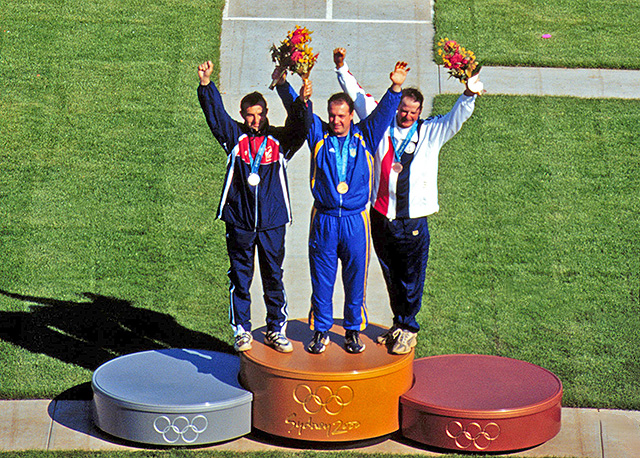The debate over whether athletes at the Olympic Games should be awarded prize money is a longstanding one, deeply rooted in the history and evolving nature of the Olympic movement. The discussion has come to the fore in 2024 as some sports have announced that their winning athletes are to receive cash prizes.
 Winners of the Men's Skeet competition at the 2000 Olympic Games
Winners of the Men's Skeet competition at the 2000 Olympic GamesWorld Athletics announced that winning athletes at the Olympics will be awarded a $50,000 cash prize in addition to their medals. The International Boxing Association also announced that it would award gold medalists $100,000, with the athlete receiving half and the NOC and the athlete's coach receiving $25,000 each. Although track and field and boxing are the first sports to introduce monetary prizes at the Olympics, over the years many countries have provided financial incentives for their medalists.
Ancient Olympic Games and Prizes
The ancient Olympic Games in Olympia, Greece had a markedly different approach to rewards compared to modern sporting events. Victors were awarded symbolic prizes that held great cultural significance.
Winners of the ancient Olympic Games events were awarded a symbolic olive wreath from a sacred tree, representing honor and victory rather than material wealth. Although the Games themselves did not offer monetary prizes, victors often received significant rewards from their city-states, including financial gifts, land, and various public honors. Successful athletes were celebrated as heroes in their home cities, receiving accolades, statues, even free meals for life, bringing immense pride to their communities.
This cultural backdrop focusing on symbolic rewards and honor laid the foundation for the concept of amateurism that would later shape the modern Olympic movement.
Amateurism in the Modern Olympics
When the modern Olympic Games were revived by Pierre de Coubertin in 1896, the principle of amateurism was a cornerstone. Coubertin and his contemporaries believed that the Olympics should be a celebration of amateur athletes competing for the love of sport and the honor of their nations, not for financial gain. This ideology was rooted in the belief that professional athletes, who earned a living through their sports, had an unfair advantage over amateurs.
Therefore, athletes who had received payment for participating in sports or who were deemed professionals were barred from competing at the Olympic Games. The amateurism rule aimed to promote fair competition, where athletes competed for personal and national pride rather than monetary rewards.
However, this strict adherence to amateurism began to show cracks as sports evolved. The realities of training and competition in the 20th century highlighted the need for athletes to receive financial support to dedicate themselves fully to their sports. This led to increasing pressure to relax the amateurism rules.
The Shift Towards Professionalism
By the late 20th century, the amateurism principle had largely been abandoned in the Olympic movement. The International Olympic Committee (IOC) recognized that the modern sports landscape had changed, and many athletes could not compete at the highest level without financial backing.
The IOC gradually relaxed the amateurism rules, allowing professional athletes to compete in the Olympics. This shift acknowledged the reality that many top athletes were already receiving sponsorships and endorsements.
While the Olympics themselves still do not directly award prize money, many national Olympic committees and sponsors provide financial rewards for medalists. For example, athletes from countries like the United States, Russia, and Singapore receive significant cash bonuses for winning medals.
Current Situation of Payment to Athletes
In the contemporary sports environment, the debate over whether athletes should be awarded prize money at the Olympics has gained new dimensions. The modern Olympic Games are a major commercial enterprise, generating billions of dollars in revenue from broadcasting rights, sponsorships, and ticket sales. Despite this, the question of direct financial compensation for athletes remains contentious.
The Arguments For and Against Awarding Prize Money
Providing prize money to Olympic athletes recognizes their years of training, dedication, and financial sacrifices, helping to offset the costs of preparation and competition. Given the substantial revenues the Olympics generate, sharing financial benefits with the athletes would be equitable and could help level the playing field for those from less financially supported countries. Furthermore, prize money could serve as an additional motivation for athletes to perform at their best, potentially resulting in more competitive and thrilling events.
Opponents argue that introducing prize money might undermine the Olympic ideals of amateurism and fair play, shifting the focus from representing one’s country to personal financial gain. There is also concern that prize money could create disparities among athletes, favoring those from wealthier nations or more lucrative sports, which could lead to unequal opportunities. Additionally, offering financial rewards might disproportionately benefit athletes from high-profile sports, thereby marginalizing those from less popular or emerging disciplines.
As the Olympic movement continues to grow and adapt, finding a fair and equitable way to support athletes financially while preserving the unique spirit of the Games remains a significant challenge. Balancing these considerations will be crucial in shaping the future of the Olympic Games and ensuring they remain a pinnacle of sporting excellence and global unity.
Related Pages
- Sports Top Earners Lists
- Olympic Games Traditions
- Excessive Prize Money to Tennis Players
- FIFA World Cup Prizes


 Upcoming Events
Upcoming Events